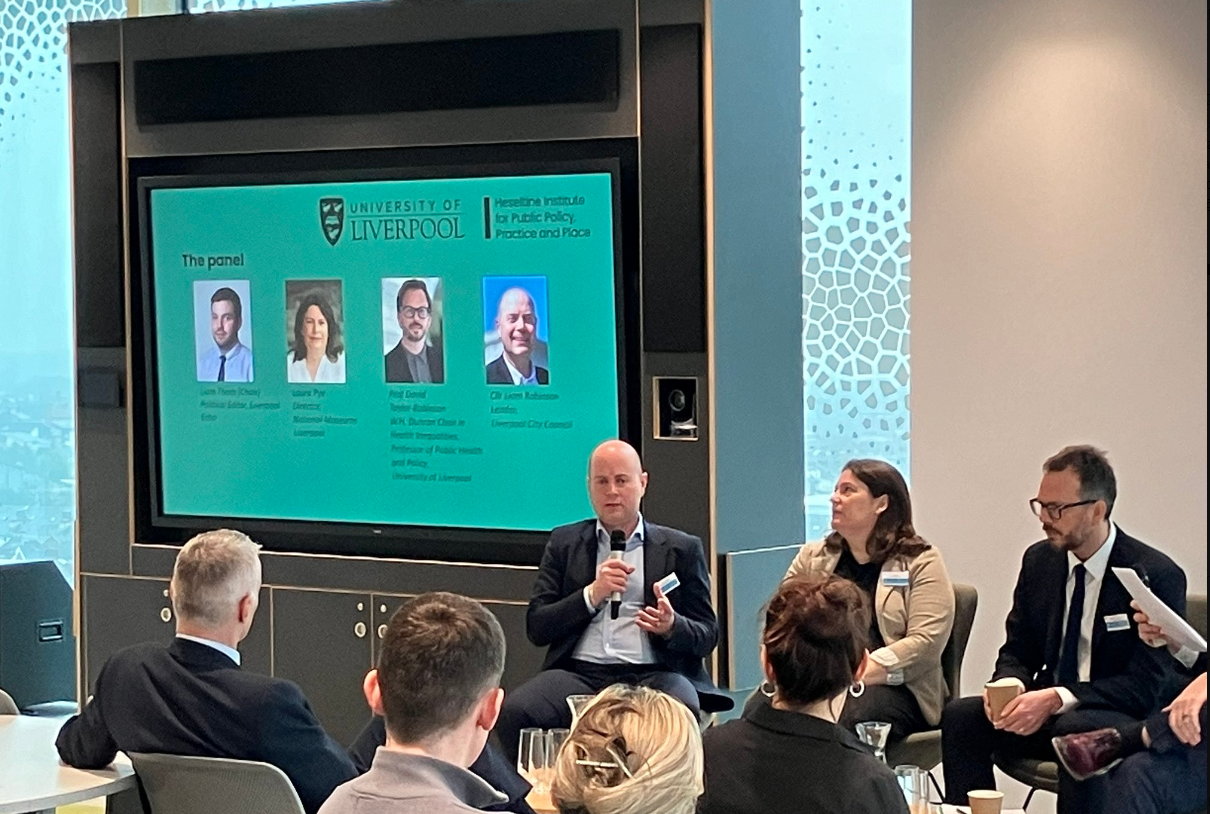Ahead of critical elections taking place in 2024, the University of Liverpool's Heseltine Institute for Public Policy, Practice and Place has launched A Manifesto for Liverpool City Region, bringing together expert interventions from academics across the University on key policy issues.
In an event today (Wednesday 20 March), a panel of key figures from across the City Region engaged with critically important topics covered in the agenda-setting manifesto through a lively, informative discussion chaired by Liam Thorp, Political Editor of the Liverpool Echo.
Vice-Chancellor at the University of Liverpool, Professor Tim Jones, opened the launch, outlining how the University of Liverpool, as a civic institution will not only contribute towards policy debates pre-election, but will work together with partners locally to address the key issues.
The manifesto combines nine short provocations from University of Liverpool researchers, each addressing a policy issue. For example, Professors Louise Kenny and David Taylor-Robinson from the University's Institute of Population Health illustrate the stark health inequalities that continue to persist across all six boroughs of Liverpool City Region.
Professor David Taylor-Robinson, who was part of the panel discussion, outlined the university's trailblazing work in helping to tackle the UK's "dismal" record on health inequalities through contributions such as the Child of the North report.
The panel debated how the Liverpool City Region can maintain a vibrant and inclusive cultural life, building on a policy provocation by Dr Richard Benjamin. Laura Pye, CEO of National Museums Liverpool, emphasised how "culture makes communities" and how culture can ensure that the City Region maintains its prominent position on the world stage.
Councillor Liam Robinson, Leader of Liverpool City Council, emphasised the need for longer-term funding strategies (including for local government) to ensure stability and longevity in the delivery of key services.
Responding to questions from the audience, the panel also debated how we can sustain and improve engagement in our democratic process, following a policy provocation from Professor Stuart Wilks-Heeg at the University's Department of Politics about restoring trust in democracy.

Professor Catherine Durose, and Professor Sue Jarvis, Co-Directors of the Heseltine Institute said: "Our main aim at the Heseltine Institute is to bring together academic expertise with policy practitioners, an ethos which is embodied in A Manifesto for Liverpool City Region.
"Against the backdrop of a local, regional and national policy landscape increasingly defined by policy uncertainty, our academics speak from a position of expertise while discussing key issues. This allows our researchers, who are experts in their field, to bring a critical perspective and re-frame broader political debate to advance our understanding of the policy challenges and opportunities facing the City Region and the United Kingdom.
"By commissioning experts from across the University we can zoom out and take an important long-view on critical debates from the housing crisis to social care to understand how these issues can be better understood as well as practically addressed by policy makers.
"We'd like to thank everyone who contributed to and engaged with ideas presented in the manifesto this morning and look forward to further discussions ahead of the Mayoral elections, General Election and beyond."
Leader of Liverpool City Council, Councillor Liam Robinson said: "In recent decades, there have been great strides in making Liverpool a fantastic place to live, work and visit.
"Now is the time to accelerate our work, moving it to the next level and building on recent successes, including securing funding to progress the next phase of Paddington village, which will provide a massive boost for our life sciences sector.
"I welcome the publication of this manifesto as a constructive challenge to leaders and stakeholders in making sure Liverpool and the wider city region achieves its potential."
You can read the Heseltine Institute's Manifesto for Liverpool City Region here.






